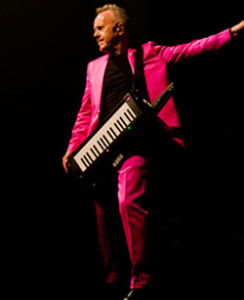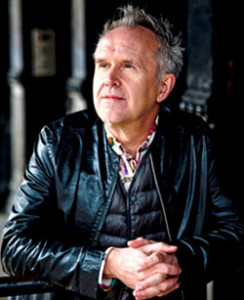By Blake Maddux

Howard Jones brings his musical artistry to Johnny D’s on Tuesday, November 3. — Photos by David Conn
Prior to becoming a mainstay of 1980s radio and Music Television (MTV), Howard Jones gave piano, keyboard, and synthesizer lessons as a way of “keeping money coming in whilst working on [his] grand project.”
When that project succeeded, it led to a string of Top 40 singles in Jones’s native UK and the US. Although he never reached the superstar levels of some of his contemporaries, his unique videos, distinctive synthesizer, and lyrics of a somewhat philosophical and optimistic bent made him one of the more memorable pop stars of the decade.
In the early 1990s, Jones became a devoted Buddhist and later spent 10 years as the musical director of the spiritually oriented Glorious Life Chorus. He continues to tour, and will arrive at Johnny D’s on November 3.
Jones spoke by phone to The Somerville Times from Nashville about his life, the state of the music industry, and the future of both.
Somerville Times: Were you eager to embrace the relatively new medium of MTV at the beginning of your recording career?
Howard Jones: Yeah, I mean it was available to us so I found it very exciting to make videos. I had been using visuals in my live show for two or three years before I ever made my first video, so it felt like a very natural thing to do for. And of course, we were some of the first people to make videos with MTV exploding and everything.
ST: How big of a factor do you think the channel was in your success?
HJ: I think it was a big factor because the 80s were so much about visuals as well as music. It was about style and the way you presented yourself. Everything was married together with the music. And of course with video, you could reach a huge amount of people. They would know what you looked like, they’d know what you were about pretty much instantly from seeing the first minute of the video.
 ST: Do you have a favorite artist in popular music that you think might surprise fans of your work?
ST: Do you have a favorite artist in popular music that you think might surprise fans of your work?
HJ: My favorite artist is Donald Fagen, and I think that would surprise quite a few people. I absolutely adore his music. I love his solo albums and I’m a big fan of Steely Dan, but it’s Donald Fagen’s solo work that I particularly like. I could just listen to that day in, day out.
ST: Has there been a specific use of one of your songs in movies, television, or anything else that made you particularly happy when you heard it?
HJ: I get to choose what things my songs get in. It’s not a random process! (laughs) The one that I think is the coolest, recently, is that I had a song in Breaking Bad, which I’m so pleased about ‘cause I love that series so much. To have a song in there is the icing on the cake for me.
I own my own publishing, so I have to be consulted before anything goes in anything.
ST: What do you perceive to be some of the effects of digital downloading and online streaming on the current generation of musicians?
HJ: I think that it’s very very difficult for musicians to make a living. Not the top echelon of artists, but people in the middle and people just starting out. It’s almost impossible, and I think that’s a shame, because it means that they will go and do other things with their talent and we won’t get a chance to hear what they would have done if they had been in bands and had been writing music. I think that the music business model isn’t working at the moment, so we need to evolve it so that people can be full-time musicians. You can’t do that at the moment. You have to have another job and music has to be your passion and you devote as much time to it as you can. I’m seeing that a lot with younger artists and musicians, and do we want that? Do we want artists to just be part-time, or do we want them to be able to devote their whole time to it? I think, really, the second one is the best.
We have to be careful or otherwise it’s just going to disappear! (laughs) It’s a transitional time, and it think that something great and amazing will evolve out of it, but we have to make sure that it does.
ST: I know that you have been a Buddhist for a number of years. Have you always been a religious or spiritual person?
HJ: I’ve been practicing Buddhism for 22 years. I’ve always had an interest in philosophies of life and religion and everything since I was a teenager. So yes, it’s always been part of me. It just took me a while to find a Buddhist practice that I really could get into and believe in. I just hadn’t found it early in my life.
ST: What can fans at Johnny D’s expect on November 3?
HJ: It’s going to be my acoustic show that I’m doing at the moment. It’s me talking about the songs and telling stories and playing some of my favorite songs from the career. Different songs from the ones that I would play with a band. I include 10 years of hits in there as well, but I’m sure there’ll be some songs that people aren’t so familiar with, but they might get to know them a bit better.
ST: In your 1985 song Things Can Only Get Better, you sang, “get to 60 and have no regrets.” Now that you are that age, do you have any regrets?
HJ: (laughs) No I don’t, actually. I’ve always been conscious that you should really pursue your dreams while you’re in good shape and you’re functioning well, and go for it. I have been reflecting a lot on that during this year, and I’ve decided that I don’t feel regret about my past. I think it’s all about the future now. Whilst I’m still capable and still on my game in my singing and my playing that I should absolutely go for it 100%. So that’s really what I’ve kind of committed to this year.












Reader Comments